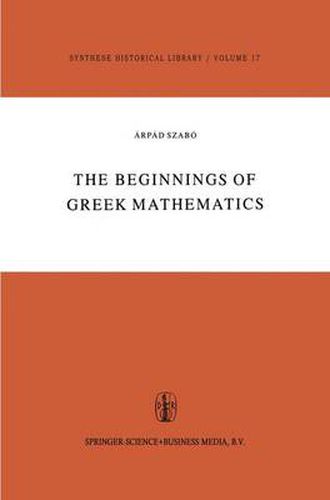Readings Newsletter
Become a Readings Member to make your shopping experience even easier.
Sign in or sign up for free!
You’re not far away from qualifying for FREE standard shipping within Australia
You’ve qualified for FREE standard shipping within Australia
The cart is loading…






This title is printed to order. This book may have been self-published. If so, we cannot guarantee the quality of the content. In the main most books will have gone through the editing process however some may not. We therefore suggest that you be aware of this before ordering this book. If in doubt check either the author or publisher’s details as we are unable to accept any returns unless they are faulty. Please contact us if you have any questions.
When this book was first published, more than five years ago, I added an appendix on How the Pythagoreans discovered Proposition 11.5 of the ‘Elements’. I hoped that this appendix, although different in some ways from the rest of the book, would serve to illustrate the kind of research which needs to be undertaken, if we are to acquire a new understanding of the historical development of Greek mathematics. It should perhaps be mentioned that this book is not intended to be an introduction to Greek mathematics for the general reader; its aim is to bring the problems associated with the early history of deductive science to the attention of classical scholars, and historians and philos ophers of science. I should like to conclude by thanking my translator, Mr. A. M. Ungar, who worked hard to produce something more than a mechanical translation. Much of his work was carried out during the year which I spent at Stanford as a fellow of the Center for Advanced Study in the Behavioral Sciences. This enabled me to supervise the work of transla tion as it progressed. I am happy to express my gratitude to the Center for providing me with this opportunity. Arpad Szabo NOTE ON REFERENCES The following books are frequently referred to in the notes. Unless otherwise stated, the editions are those given below. Burkert, W. Weisheit und Wissensclzaft, Studien zu Pythagoras, Philo laos und Platon, Nuremberg 1962.
$9.00 standard shipping within Australia
FREE standard shipping within Australia for orders over $100.00
Express & International shipping calculated at checkout
This title is printed to order. This book may have been self-published. If so, we cannot guarantee the quality of the content. In the main most books will have gone through the editing process however some may not. We therefore suggest that you be aware of this before ordering this book. If in doubt check either the author or publisher’s details as we are unable to accept any returns unless they are faulty. Please contact us if you have any questions.
When this book was first published, more than five years ago, I added an appendix on How the Pythagoreans discovered Proposition 11.5 of the ‘Elements’. I hoped that this appendix, although different in some ways from the rest of the book, would serve to illustrate the kind of research which needs to be undertaken, if we are to acquire a new understanding of the historical development of Greek mathematics. It should perhaps be mentioned that this book is not intended to be an introduction to Greek mathematics for the general reader; its aim is to bring the problems associated with the early history of deductive science to the attention of classical scholars, and historians and philos ophers of science. I should like to conclude by thanking my translator, Mr. A. M. Ungar, who worked hard to produce something more than a mechanical translation. Much of his work was carried out during the year which I spent at Stanford as a fellow of the Center for Advanced Study in the Behavioral Sciences. This enabled me to supervise the work of transla tion as it progressed. I am happy to express my gratitude to the Center for providing me with this opportunity. Arpad Szabo NOTE ON REFERENCES The following books are frequently referred to in the notes. Unless otherwise stated, the editions are those given below. Burkert, W. Weisheit und Wissensclzaft, Studien zu Pythagoras, Philo laos und Platon, Nuremberg 1962.